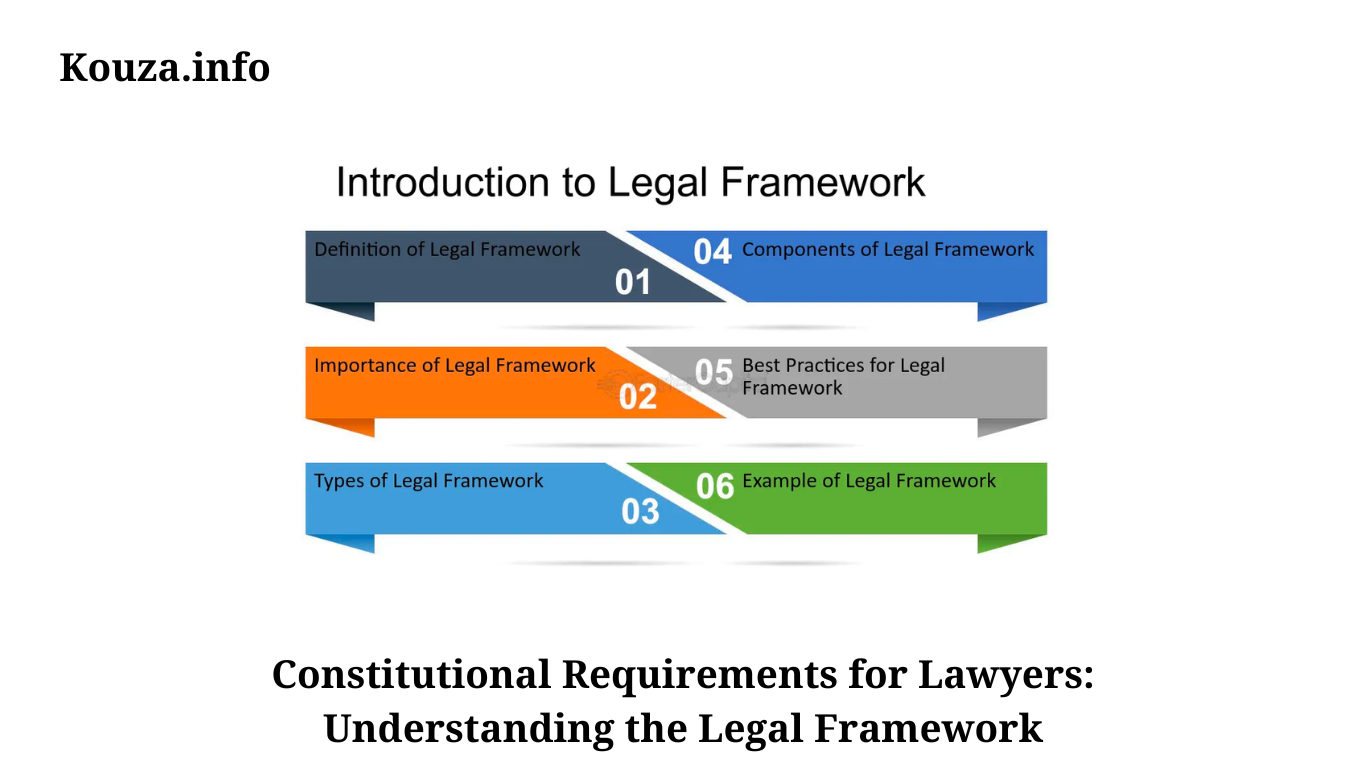Pros and cons of being a constitutional lawyer: best guide

It’s crucial to weigh all of the benefits and drawbacks of this fascinating profession if becoming a lawyer is something you’re interested in. You can decide whether you’re a good fit for this career path by understanding the pros and cons of being a constitutional lawyer. In this article, kouza.info discusses what a lawyer does as well as the pros and cons of being a constitutional lawyer.
What does a lawyer do?
Lawyers give their customers high-quality legal counsel by utilizing their legal expertise and ethical legal procedures. On the best course of action in both civil and criminal matters, they provide clients advice. For both people and corporations, lawyers also interpret the law and other laws.
When they have a case, they do the required preparations, acquire the required proof, assess the likely outcomes, and frequently appear in court to defend their clients. They use persuasive arguments, a mix of their analytical and persuasion skills, and logical thinking to make their case to the judge and jury in court. – pros and cons of being a constitutional lawyer.

You have just learned about What does a lawyer do? for a better explanation let’s go to the next section: Pros and cons of being a constitutional lawyer.
Pros and cons of being a constitutional lawyer
The pros and cons of being a constitutional lawyer, pros of being a constitutional lawyer including:
Pros of being a lawyer:
Whatever sort of lawyer you are, there are many benefits to being in this line of work. You may decide whether you want to pursue a career in this industry by being aware of the advantages of this employment. The pros and cons of being a constitutional lawyer. Here are 11 pros of this kind of work:
Numerous job choices are available to lawyers, including positions in the public and commercial sectors. After passing the bar test, you can select the specialization that most interests you. Pros and cons of being a constitutional lawyer. Pros of being a lawyer:
Starting your own business: You can launch your own business once you have a legal degree and some relevant experience. You may choose how you want to run your own legal firm when you own it.
Lucrative career: Lawyers have the potential to make a significant salary. They earn an annual income of $50,979, which is the national average. Even while you might not start out making as much money as a lawyer, you can eventually get there with enough effort and experience. Finding fulfillment in your particular career, though, could be more valuable than your yearly pay.

Intellectual stimulation: Your regular tasks as a lawyer may offer you a lot of mental challenge and excitement. For instance, one of your duties may be to comprehend intricate legal theories and predict the likely results of a case for your clients. To do this, you must solve difficulties, formulate a hypothesis, and develop a legal plan that will help your client in court.
Flexibility: Although some attorneys have erratic schedules, this profession often allows you to tailor your schedule to meet your own demands. A legal company you work for could even let you to do business remotely. By offering you this choice, you may spend more time with your family and have a better overall work-life balance. A personal assistant is another option you have for assistance.
Adaptable skills: You have the chance to learn and develop a number of talents as a lawyer that you may use in another job, whether it’s in the legal sector or beyond it entirely.
Ability to help others: You have the power to assist companies and others in need as a lawyer. While working in this field gives you the opportunity to pursue justice for these parties, it also gives you emotional fulfillment.
Work environment: Many attorneys work throughout the day in a legal firm, business, or governmental organization. This allows them to escape the typical workplace cubicle that is offered by most professions. This benefit is especially helpful if you want an open floor plan.
Work perks: Lawyers might benefit from a number of employment advantages in addition to a nice workplace.
Argue and debate: Although not all lawyers represent clients in court, many trial lawyers do. This may be the right job for you if you want a challenge and engaging in debate with other lawyers. In a court case, you have the opportunity to not only submit your results but also to make your case to the judge, jury, and other participants through analyzing the law and discussing legal ideas in the courts.
Prestige: A lot of individuals think that the legal profession has a high degree of prestige. This usually results from their strong academic credentials and the level of influence they enjoy. The media frequently portrays this line of work as attractive and deserves respect.
Cons of being a constitutional lawyer
The pros and cons of being a constitutional lawyer, Cons of being a constitutional lawyer including:
High-stress situations: It’s critical to satisfy deadlines and client expectations when working in this field of work. Additionally, you can encounter difficult and upsetting situations that could harm your mental health. In order to succeed in this field, emotional self-control is crucial. – pros and cons of being a constitutional lawyer.
Long hours: Even though your schedule is flexible, there may be days when you need to work a lot of hours to assist your clients. This mostly applies to newly admitted attorneys who are just beginning their professions. Although a 40-hour workday is the standard, some attorneys spend 60 to 90 hours per week, depending on the demands of the case they are working on.
Education is expensive: Attending law school has a high price tag. Usually, the higher the cost of schooling, the better the law school. New attorneys might not be able to pay off their debt as rapidly as they’d want to even with a great paycheck.
less possibilities to serve clients: A client is not always required to seek legal guidance from a lawyer. Self-service goods, self-help legal websites, legal document techs, and virtual law offices have all grown in popularity recently. These may not always be the best choices for legal concerns, but they nonetheless steer potential clients away from attorneys.
Clients aren’t spending as much since they are more aware of the costs of hiring attorneys and the fees they demand. When clients are more aware of their legal expenses, lawyers are compelled to provide more affordable fees in order to win their business. They can transfer their business elsewhere and find the assistance they want at a lower cost if they are charged a price that looks excessive.

Legal work might be outsourced because many other nations have cheaper labor costs due to their lower cost of living. In comparison to the United States and other industrialized nations, they can accomplish the same amount of labor for less money. When this occurs, conventional employment options are less plentiful because they are given to local fulfillment centers or low-wage workers abroad. – pros and cons of being a constitutional lawyer
Negative stigma: Although practicing law is a respectable profession, there is always a danger that you may develop a negative reputation. Even if you win your lawsuits, you might not be able to shake the public’s skepticism and humor. – Pros and cons of being a constitutional lawyer.
Clients who are challenging: As a lawyer, you frequently get to pick the clients you wish to represent. However, you might not be able to afford this luxury if you wish to have a consistent source of income. Even while some of your clients could be kind and competent, this might not always be the case.
Job market competition is projected to be fierce for this profession, despite the Bureau of Labor Statistics’ prediction of a 4% increase in employment over the next ten years. This is due to the fact that there are more recent graduates than there are open positions.
A greater dependence on technology: The development of technology has had an impact on the judicial system. Understanding a variety of technical platforms, including management tools, spreadsheets, and billing software, is essential for being a successful lawyer.
Law changes: As a lawyer, it’s crucial to stay current on the law and track changes as they happen. To make sure you are adhering to current legal standards and procedures, you must conduct extensive study on each case. Even if it might not always be the case, keeping up with these changes can be difficult and make for lengthy workdays. – pros and cons of being a constitutional lawyer.
The pros and cons of being a constitutional lawyer. Hopefully through the article Best pros and cons of being a constitutional lawyer by kouza.info you will have useful knowledges.
Conclusion: So above is the Pros and cons of being a constitutional lawyer: best guide article. Hopefully with this article you can help you in life, always follow and read our good articles on the website: kouza.info




